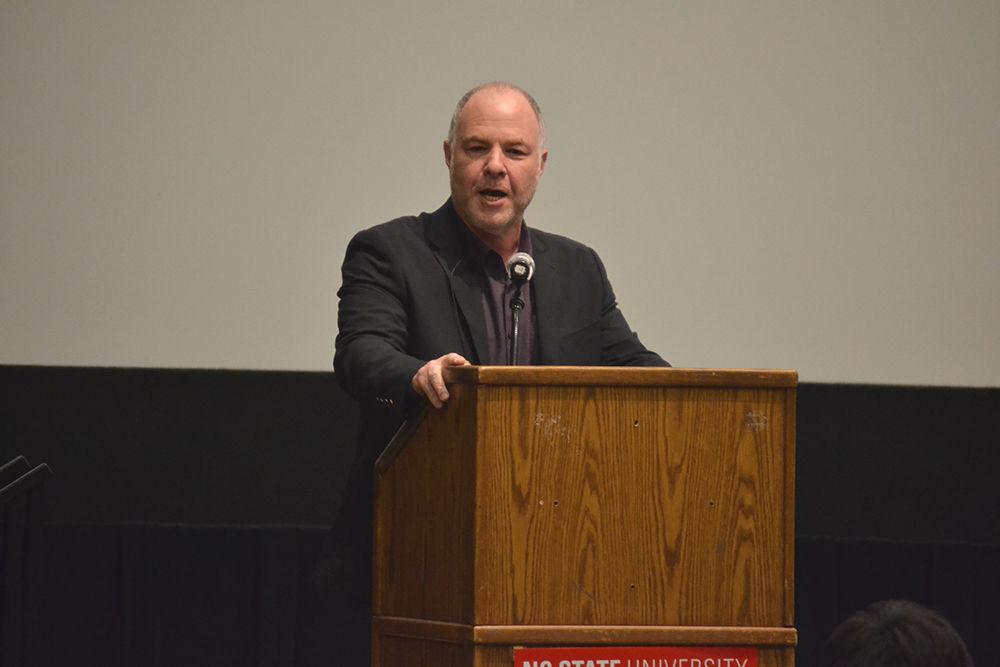Jackson Katz, co-creator of the bystander approach, is internationally renowned for his pioneering work in gender violence prevention education. As part of a series of Women’s History Month presentations by the Women’s Center, Katz spoke about gender violence and social justice Tuesday evening at Witherspoon Campus Cinema.
Katz’s discourse exemplified and justified the need for responsible and proactive male leadership in the feminist movement.
“That whole range of issues, in short terms gender violence issues, have been seen as women’s issues that some good men help out with,” Katz said. “I don’t even accept the premise. I’m going to argue that these are men’s issues.”
Privilege played a central role in Katz’s argument: in his lecture, he articulated that most leadership positions in every major country are held by men and that such leaders should be held accountable to the social pains caused by gender violence.
“This is a leadership imperative,” Katz said. “That means that if you are a man and you are in a leadership position, you need to know about the issues of sexual violence and all of its interconnections with other issues.”
Although evident through his gender research, Katz explained that most men in power lack knowledge of the effects of gender violence on the welfare of a company, a school or a society at large.
“There is no peace on the streets if there’s no peace in the family,” Katz said. “There’s no peace in the community if there’s no peace in the family — there’s no peace in the world if there’s no peace at home because the crucible for so much antisocial behavior out in the world somewhere is violence in the lives of boys and young men.”
Noting the diversity of genders throughout, Katz emphasized that the male gender, with its social privilege, was key to furthering equitable conditions for all genders. Overall, Katz proposed that feigning such an imperative would result in further social consequences from the trauma and inequity brought about by gender violence. As a privileged white male, Katz explained that he could voice gender issues more readily to a male audience and garner greater sympathy through in-group bias.
“To the men, one of the things that we can do is to say these things is ways that sometimes women cannot say or cannot be heard,” Katz said. “I don’t think that it’s fair, but it’s how the world works.”
Katz’s idea of in-group policing and positively exerting privilege to speak out on gender issues originally played into his theory of the bystander approach. To explain the theory behind the approach, Katz drew a blank pyramid, capped with a darkened peak. To Katz, the majority of events preceding the amount of apparent gender violence were rooted in a larger body of ignorance of controlling male behaviors and historically-male, passive responses to social stigmas placed on women victimized by such behavior.
“I’ve had times recently where I’ve had the opportunity to intervene where guys were talking misogynistically,” said Parker Colbath, a junior studying chemical engineering. “[Gender violence] is more of a men’s issue, and women cannot solve it all. We all have to play our role as feminists.”
For Katz, the greatest challenge remains in convincing those with privilege to speak out on behalf of gender violence and its effects on the well-being of society.
“I grew up in a very small country town where a lot of these issues were not addressed,” said Marianna Connor, a freshman studying foreign languages and literature. “I find it interesting to realize a lot of the privileges that I have had and — from that place — being able to voice concerns that other people cannot.”
Katz is the founder and director of MVP Strategies, a group providing gender violence education around the world. In addition to domestic violence, Katz speaks extensively in the U.S. and around the world on topics related to violence, media and multiracial, multinational masculinities.
To learn more about Katz and his work, visit his website, https://www.jacksonkatz.com.








